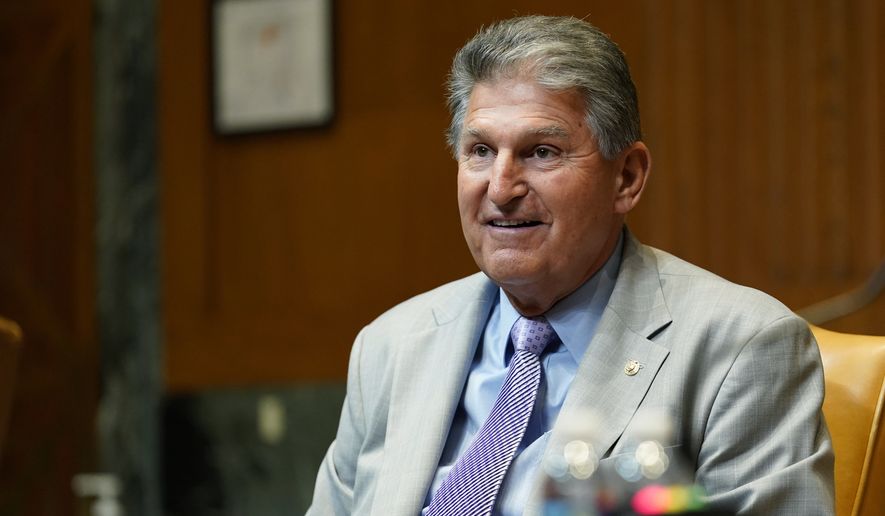OPINION:
It was inevitable that President Biden’s indifferent relationship to the truth eventually would catch up with him. At a recent event in Tulsa, Oklahoma, it did.
Mr. Biden went out of his way to attack two Democratic senators, saying that they voted more with the Republicans than with Democrats. Although he did not name the senators, he meant Joe Manchin III of West Virginia and Kyrsten Sinema of Arizona.
In attacking them publicly, and obviously incorrectly — both vote far more often with the Democrats than the Republicans — Mr. Biden gave license to the party’s progressives to follow suit, which, of course, they did.
Not surprisingly, Mr. Manchin responded in kind, making it clear in a Sunday column in the Charleston Gazette-Mail that he had no intention of voting for HR 1, which would federalize election laws in these United States, nor would he vote to change the Senate’s filibuster rule.
It was his clearest statement to date on both topics and served to announce both the end of his tolerance with the progressives’ wish list and with Mr. Biden’s daydream of becoming the next FDR.
As a practical matter, Mr. Manchin’s declaration of independence also means that all of the most extreme parts of the progressive agenda — HR 1, statehood for the District of Columbia and Puerto Rico, court packing, the PRO Act, gun control, etc. — are now dead, unless the composition of the Senate changes due to retirement or death.
Progressives have responded about like you would expect. They’re angry at Mr. Manchin for his clarity, but not at Mr. Biden for starting a fight he had no intention of finishing. If the president’s agenda needed Mr. Manchin’s vote so desperately, he probably should have tried more honey and less vinegar.
The truth is that Mr. Manchin is merely the ringleader and face of the moderate Senate Democrats. Sens. Sinema, Jon Tester of Montana, Maggie Hassan of New Hampshire, Gary Peters of Michigan, Mark Kelly of Arizona, and maybe one or two others represent states that require them to hew toward the midline of most policies. They have been grateful that Mr. Manchin has been willing to take the slings and arrows of the progressive and media malcontents (who, by the way, continue to hound Mr. Manchin even after his definitive statement).
The Democrats face the same problem in the House, where moderates in different configurations have effectively scuttled drug pricing legislation (10 House Democrats have said they can’t support it in the absence of Republican votes) and stepped-up basis, which is a key component in Mr. Biden’s all-but-dead tax increase proposal. (13 House Democrats wrote the president identifying it as a non-starter.)
The path forward is even complicated by geography. All but two of the New York House Democrats have said they will not support tax legislation that does not address the cap imposed on state and local tax deductions by the Republicans’ 2017 tax law, even though removal of the cap would predominantly serve the interests of millionaires (mostly in New York) and even though Sen. Bernard Sanders, Vermont independent, has indicated that removal of the cap would be contrary to progressive ideals.
In short, the legislative process is working like it should: weeding out the truly terrible ideas and sanding off the worst parts of what remains.
Those who voted for President Trump should take notice. Much of the first 90 days of this year were consumed by people predicting apocalyptic disaster, as if the process were made of gossamer and would tear at the slightest tug.
That was nonsense then and is nonsense now. As mentioned way back in January, one set of election results is not going to be dispositive to the fate of the nation. Invoking the eschaton because you don’t like the results of an election is misguided at best and intentionally deceiving at worst.
It is time to stop the endless round of talk — so much talk — about the 2020 elections. Shave your beards, come out of the caves, and get ready for the 2022 midterm elections.
The Biden administration is pretty much over at this point. Without a significant tax increase, the “infrastructure” plan will be more modest than expected (unless the Republicans keep negotiating with themselves), and the anti-family plan will be mostly scrapped.
That leaves regular order — the fiscal 2022 budget and National Defense Authorization Act this year, and a few political votes (for the election cycle) next year to extend the child tax credit, the health insurance premium support tax credit, and the child care tax credit.
The administration’s time and attention will be taken over by events — the border crisis, cybersecurity episodes, Chinese communist adventurism, the inevitable scandal (I’m betting on Hunter Biden) — that it is likely to handle very poorly.
In short, the Biden administration will look like the Obama or the Clinton administration — lots of excitement and mayhem at the beginning, then a long, slow, slide into boredom and irrelevance.
You can either thank or curse Mr. Manchin and the voters of West Virginia for that.
• Michael McKenna, a columnist for The Washington Times, is the president of MWR Strategies. He was most recently a deputy assistant to President Trump and deputy director of the Office of Legislative Affairs at the White House.




Please read our comment policy before commenting.